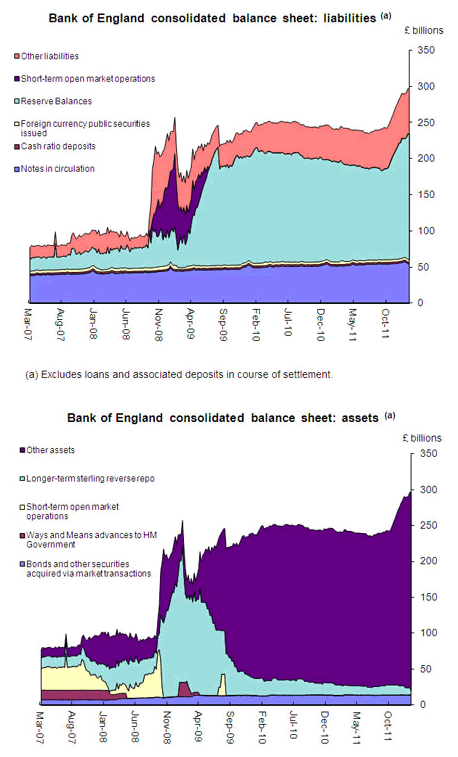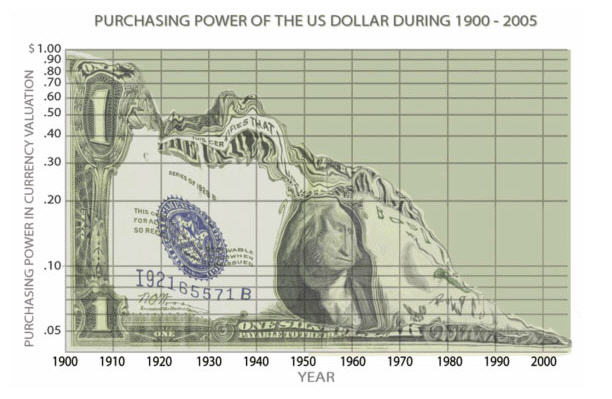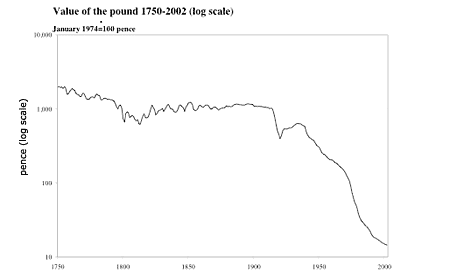Gold Money and Central Banking
Politics / Central Banks Feb 01, 2012 - 04:09 AM GMTBy: William_Bancroft
Gold Money and Central Banking
 Continuing a recent piece about today’s central banking elite, Will Bancroft examines recent political attention being focused on the Bank of England. Is it possible that politicians are missing the bigger point? Read on to see how well central bankers have managed our money this last hundred years, and what role gold and silver could play.
Continuing a recent piece about today’s central banking elite, Will Bancroft examines recent political attention being focused on the Bank of England. Is it possible that politicians are missing the bigger point? Read on to see how well central bankers have managed our money this last hundred years, and what role gold and silver could play.
Recent debates about the Bank of England’s (BoE) conduct and actions during the Credit Crunch have caught the headlines recently. In fact central bankers have generally been in the spotlight recently. Ben Bernanke’s address to the nation a last week prompted us to take another look at what drives his monetary policies.
There is a political debate brewing about whether the BoE needs radical reform, specifically whether politicians should exercise more supervision of those entrusted to the UK’s monetary levers of power. Members of Parliament are pushing for greater scrutiny and are set to release their findings into the BoE’s own suggestions for reform.
The Treasury Select Committee (TSC), headed by Conservative MP, Andrew Tyrie, wants a supervisory super-committee to act as a board-like entity, and also cede more power to the Chancellor. All the usual commentary about ‘public body’ and ‘looking after the public interest’ has been trotted out.
Tyrie and other MPs have been engaged in some verbal sparring with Mervyn King, Governor of the BoE. In a Westminster debate recently it felt like a dog pack of MPs baiting Mervyn the grizzly bear.
Liberal Democrat MP, John Thurso, has scored the best sound-bite so far. When discussing the BoE’s own proposal for a more limited oversight committee, Thurso quipped that this would be: “a committee (to) determine whether all the wrong decisions had been taken correctly”. It is ironic that a politician pushing for another super-committee is making witticisms about ineffectual bureaucracy.
Apparently this debate is healthy and useful to the UK and its taxpayers.
Are we debating the right thing?
Like the Federal Reserve, The BoE spent money hand over fist to keep the economic plates spinning in 2008. Debates over how much money was injected continue, but the charts from the BoE suggest £200bn plus.

What the politicians and the BoE’s senior staffers are arguing about are measures to ensure that in future the bank jumps into the fray in the right way, at the right time, and deploying the right amount of capital.
Can any amount of committee supervision provide the answers? We suspect not.
Given the pseudo-scientific nature of economics generally, and the fact that opinions vary so widely on how to stimulate and when, would another committee just add more cooks with more opinions to spoil the broth? Albeit a few more democratically elected cooks we concede.
In fact, should we not remind ourselves what central banks are there to do first? In last week’s discussion of Ben Bernanke, we let Walter Bagehot hold the intellectual floor with his thoughts on central banking, but let’s look deeper into whether we need central banks.
The raison d’etre of central banking.
The primary function of a central bank is to manage the nation’s money. We devolve this power to those apparently expert in managing our money and preserving our purchasing power.
The problem is that central bankers have not proved so successful at this. Take a look at the chart below and remember the Federal Reserve was created in 1913. How well has the Fed preserved the dollar for US citizens?

The stewards of the franc, pound, and other assorted currencies have also not proved much better at managing their nation’s money. The chart below, from an old House of Commons paper in fact, shows a similar decline in the purchasing power of the pound.

(Note the 150 years of relative currency stability during the years 1750 and 1910 when the pound spend most of its time backed by gold bullion).
One of the few exceptions to the rule was occasional German monetary discipline after the Second World War, although people can be pretty disciplined for a while when they have the memory of such a painful experience fresh in their minds (the hyperinflation and mass wealth destruction of Weimar Germany).
Why are the bankers so useless with money?
The answer is that money is the most important commodity in our lives, and entrusting control and issuance of it into the hands of politicians and central bankers is great folly.
People are prone to err, and we all have our agendas. Politicians want to get re-elected and stay in power; central bankers want to prolong their own longevity too. We don’t blame humans as agents, we are what we are and we should celebrate it; we blame the system.
Economists and bankers are not able to always know when to intervene, in what way, and in what manner. Monetary history has shown that it is far better to leave money backed by something inert, an unquestionable store of value, and outside of human temptation; gold and silver.
People do not have the discipline to handle such power. We should not let our agendas interfere with something as important as money.
Here’s what the great Austrian economist, Murray N Rothbard had to say about money:
Money is different from all other commodities: other things being equal, more shoes, or more discoveries of oil or copper benefit society, since they help alleviate natural scarcity. But once a commodity is established as a money on the market, no more money at all is needed. Since the only use of money is for exchange and reckoning, more dollars or pounds or marks in circulation cannot confer a social benefit: they will simply dilute the exchange value of every existing dollar or pound or mark. So it is a great boon that gold or silver are scarce and are costly to increase in supply. But if government manages to establish paper tickets or bank credit as money, as equivalent to gold grams or ounces, then the government, as dominant money-supplier, becomes free to create money costlessly and at will. As a result, this ‘inflation’ of the money supply destroys the value of the dollar or pound, drives up prices, cripples economic calculation, and hobbles and seriously damages the workings of the market economy.It is this privilege to create money at will and without cost that is in fact so… costly.
The actions by central banks since 2008 have involved unprecedented levels of money creation. This has not caused runaway inflation yet (we are officially told), as it has not been transmitted from the core of the banking system through its fractional reserve banking model. The money is being hoarded to prop up bank balance sheets… for the moment.
There is great potential for problematic inflation, and inflation is nothing more than a tax on your earnings and savings.
Fire up the printing presses
Vast amounts of newly created money was provided to save the financial system from catastrophically collapsing in on itself, if you believe one set of arguments; or in a futile effort to prevent the system cleansing itself according to other arguments.
All we know is that the financial authorities stepped in to allocate vast sums of capital, with apparently good intentions, at a time they judged to be right. We had a look at what sort of thinking underpins these intentions previously.
The aforementioned politicians are seeking to erect a better structure in an attempt to ensure that in future the bank intervenes in the right way, at the right time, and with enough easy money in its repair kit.
This all feels very wrong headed to us, and worryingly socialist. However, as we know politicians and central bankers have vested interests in controlling this crucial heart of the system.
We find the current system of crony capitalism maladaptive and ask our politicians to think with greater historical depth, back to the teachings of classical economics. The mission creep of central banking and our muddled attempt to better manage this is just one of the manifestations of our problems.
Luckily there are some politicians who are versed in the history of monetary economics, Douglas Carswell MP is one of a small but vocal crew. We are looking forward to interviewing Mr Carswell shortly, and his views on sound money echo those expressed by Steve Baker MP in a previous interview with The Real Asset Company.
The debate should not be about central banks, it should be about money itself.
Losing faith in central banks? Learn how to invest in gold and silver.
Protect yourself from bankers and politicians. Buy gold bullion safely and securely with The Real Asset Company.
Will Bancroft
For The Real Asset Company.
Aside from being Co-Founder and COO, Will regularly contributes to The Real Asset Company’s Research Desk. His passion for politics, philosophy and economics led him to develop a keen interest in Austrian economics, gold and silver. Will holds a BSc Econ Politics from Cardiff University.
© 2012 Copyright Will Bancroft - All Rights Reserved
Disclaimer: The above is a matter of opinion provided for general information purposes only and is not intended as investment advice. Information and analysis above are derived from sources and utilising methods believed to be reliable, but we cannot accept responsibility for any losses you may incur as a result of this analysis. Individuals should consult with their personal financial advisors.
© 2005-2022 http://www.MarketOracle.co.uk - The Market Oracle is a FREE Daily Financial Markets Analysis & Forecasting online publication.



